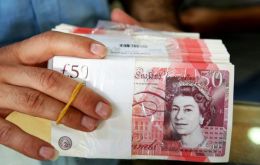MercoPress. South Atlantic News Agency
Tag: UK inflation
-
Wednesday, May 17th 2017 - 10:33 UTC
UK's April inflation at its highest since September 2013; Bank of England expects it to peak at 3%

UK's inflation rate rose last month to its highest since September 2013, official figures show. Inflation now stands at 2.7% - up from 2.3% in March - and above the Bank of England's 2% target. The main reason was higher air fares, which rose because of the later date of Easter this year compared with 2016.
-
Wednesday, April 12th 2017 - 09:44 UTC
UK inflation steady in March with rising food and clothing prices

Inflation in the United Kingdom held steady last month, as rising prices for food and clothing were offset by lower air fares. The UK Office for National Statistics, ONS, said inflation as measured by the Consumer Prices Index remained at 2.3%.
-
Saturday, September 19th 2015 - 07:15 UTC
UK economists debate on further interest rate cuts to combat low inflation

The Bank of England may have to cut rates to combat low inflation, rather than raise them as its next move, its chief economist Andy Haldane has said. UK inflation may not pick up in the second half of the year, and there are risks of fallout from emerging economies, he said in a speech.
-
Thursday, March 12th 2015 - 01:11 UTC
Bank of England contrary to further cut interest rates to combat low inflation
![It would be “extremely foolish to try to lean against this oil price fall today [and] try to provide extra stimulus to try to get inflation up at this point in time”.](/data/cache/noticias/49503/260x165/mark-carney.jpg)
Bank of England governor Mark Carney said it would be “extremely foolish” for the Bank of England to cut interest rates to try to combat low inflation. He reiterated comments made in February that the drop in prices was temporary and largely caused by the sharp fall in oil prices.
-
Friday, February 20th 2015 - 05:05 UTC
UK inflation 0.3% in January on cheaper petrol and food prices

The rate of UK Consumer Prices Index inflation fell to 0.3% in January, its lowest level since records began. Cheaper petrol and lower food prices, helped by a supermarket price war, cut the rate from 0.5% in December, Office for National Statistics figures show.
-
Thursday, April 17th 2014 - 04:53 UTC
For third consecutive month UK inflation stands below the 2% target rate

The UK inflation rate as measured by the Consumer Prices Index (CPI) fell to 1.6% in March from 1.7% in February, according to the Office for National Statistics (ONS). It is the third consecutive month inflation has been below the Bank of England's 2% target rate, and the lowest rate since October 2009.
